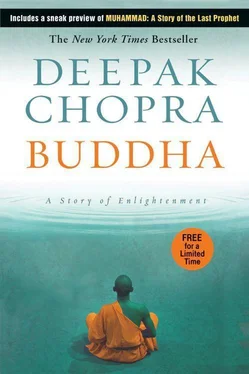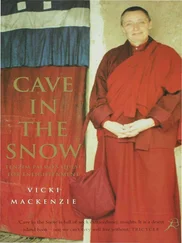Gray-haired Kumbira kept her gaze moving, aware of the dangers that lurked on both sides. This road, which was just a narrow cut in the granite slope, had begun as a smuggler’s trail when poached deer hides, spices, and other contraband were trafficked to Nepal; it was still favored by bandits. Tigers were known to snatch their prey from terrified bands of travelers in this area, even in the brightest hour of the day. To ward them off, the bearers wore masks facing backward on their heads, believing that a tiger will only leap from the rear, never directly at a person who is looking at it.
Kumbira rode up the trail until she was abreast of Balgangadhar, the head guard. The warrior regarded her stoically, wincing a little when the queen cried out again.
“She can’t hold out much longer,” Kumbira said.
“And I can’t make the road any shorter,” Balgangadhar grumbled.
“What you can do is hurry,” she snapped. Kumbira knew he was ashamed at not being with the king in battle, but Suddhodana wanted one elite guard to honor his wife.
With the slightest bow from the shoulders that etiquette permitted, the guard said, “I’ll scout up ahead for camp. The locals say there’s a woodcutter’s clearing with some huts in it.”
“No, we move together,” Kumbira protested.
“There are other men here to protect you while I’m gone.”
“Really?” Kumbira cast a critical eye over her shoulder at the ragged band. “And who will protect them, do you suppose?”
THEY WILL TELL YOU that Maya Devi-the goddess Maya, as she became known-arrived by moonlight in Lumbini Grove, one of the most sacred sites in the kingdom. They will tell you that she did not give birth in the forest by accident. Destiny guided her there. She expressly wanted to visit the sacred grove because a huge tree stood there like a pillar to the mother goddess. Maya’s premonition had told her that this birth would be sacred.
In reality she was a frightened, fragile young woman who barely escaped being lost in the wilderness. And the sacred tree? Maya clung to the trunk of a large sal tree because it was the closest and most common tree in the clearing. Balgangadhar had found a sheltered place beside the trail, and the royal palanquin arrived there only moments before Maya went into the final stages of labor. The court ladies formed a close circle around her. She held on tight, and deep in the night she was delivered of the son her husband the king so desperately wanted.
Kumbira died long before the legends grew, so she is not pictured in them, barking commands to the scurrying women, shooing away the men, nearly scalding herself to bring a kettle of water on the run from the bonfire. It was she who first held the baby. Tenderly she scrubbed the blood from his tiny body, making the squalling newborn ready to show to Maya. The queen lay quietly on the ground, almost listless. The first nursing, an important ritual in the native custom, would come in the morning. Despite the baby’s apparent good health, Kumbira was worried, made anxious by every nocturnal sound but most of all by Maya’s labor, which had been too long and painful.
“Now my husband can die happy,” Maya whispered in a tired, weak voice. “And I will not be cursed when I am gone.” Kumbira started. How could Maya think about death at that moment? Kumbira’s eyes searched the darkness surrounding their stranded camp. The younger court ladies were full of praise for the brave new mother, relieved that the ordeal had come to an end, buoyant at the prospect of returning home to their soft beds and paramours. Their happiness increased when the full moon, an auspicious omen, rose over the treetops.
“Here, Your Highness,” said Utpatti, one of the handmaidens, leaning close. “There is something you must do.”
Before anyone could stop her, Utpatti opened Maya’s robe and exposed her breasts. Embarrassed and confused, Maya quickly pulled her robe together again with one hand.
“What are you doing?” she demanded.
Utpatti drew back. “It will help with the milk, Your Highness,” she whispered, looking unsure of herself. She gave sidelong glances at the other women. “Having moonlight on your breasts. Country women all know that.”
“Are you from the country?” Maya asked.
The others tittered. Making a show of not being bothered by them, Utpatti said, “Once.”
Maya leaned back again and exposed her full breasts to the moon. They were heavy with milk already.
“I feel something,” she murmured. Her mood had changed; a note of ecstasy was in her voice, clearing away the pain. If she wasn’t a goddess herself, she exulted in being touched by a goddess, the moon. She took her infant and held him up.
“See how quiet he is now? He feels it too.” At that moment Maya believed in her heart that her wishes had been fulfilled. There is a name in Sanskrit that expresses this idea. She lifted the baby higher.
“Siddhartha,” she said. He who has attained all desires. Recognizing the solemnity of the moment, the court ladies bowed their heads, even the ever-wary Kumbira.
The gray rain blanketed Suddhodana and his men as the towers of home loomed over them. The sentry shouted from his post, and the great wooden gates of the capital opened. “Look sharp!” sergeants shouted down the line. Few citizens had turned out to greet them. Suddhodana knew that the huddled clumps of women lining the street were there to search the army with anxious faces, praying that their husbands and sons were still among the living.
That morning the queen had awakened at dawn in case her husband returned early, but then the rains set in, slowing everything. The trip down from the mountains had passed in a kind of blurred ecstasy, which grew stronger even as Maya’s body began to fail. There was much whispering at court because she had refused the services of a wet nurse. “It cannot be that loving my child will kill me,” she said.
Her mind returned to a dream that had visited her ten months ago. It began with Maya waking up in her private bedchamber. She shaded her eyes against a light that had appeared in the room. Out of the light emerged three angelic beings in the form of smiling young maidens. Sitting up, Maya immediately recognized her visitors for what they were-devas, or celestial beings.
The three devas gestured for her to join them. In wonder that they had chosen her, Maya climbed from her warm bed to follow. With a glance over their shoulders, they walked through the walls of her bedroom as though through smoke. Maya never felt the wall as she too passed through it. On the other side she was pulled faster, until the palace grounds and the world beyond blurred in passing. A brighter light loomed ahead, and in a moment Maya saw that it was the sun reflected off snow. Daylight dazzled across the crystalline surface of a high mountain lake circled by sentinel peaks.
The Himalayas (for she knew with certainty that the devas had brought her there) had been distant, imposing presences all her life. Maya never imagined being among them, and now the three maidens led her to a pebble shore on the opposite side of the lake. Its surface was calm and mirror-bright.
The devas began disrobing her. Maya wasn’t disconcerted; she grew relaxed. Almost as quickly as they took her clothes away, they fit her with the finest garments she had ever seen. With silent smiles they reached out to touch Maya’s belly. The contact was warm and exciting. She stepped into the water of the lake, deeper and deeper. Then she awoke, finding herself sitting up in bed as if she’d never left it. Except that her bedchamber was filled by a creature whose eye captured her gaze. Expanding from the eye was a whiteness that took the shape, as Maya’s mind cleared from sleep, of an enormous elephant as pale as snow. The creature looked at her with warm, confident intelligence. Then it lifted its trunk in a kind of salute. Unexpectedly, a burning hunger filled Maya. Then she woke again, sitting up in bed but alone. The unaccustomed desire was still within her and wouldn’t be denied.
Читать дальше












